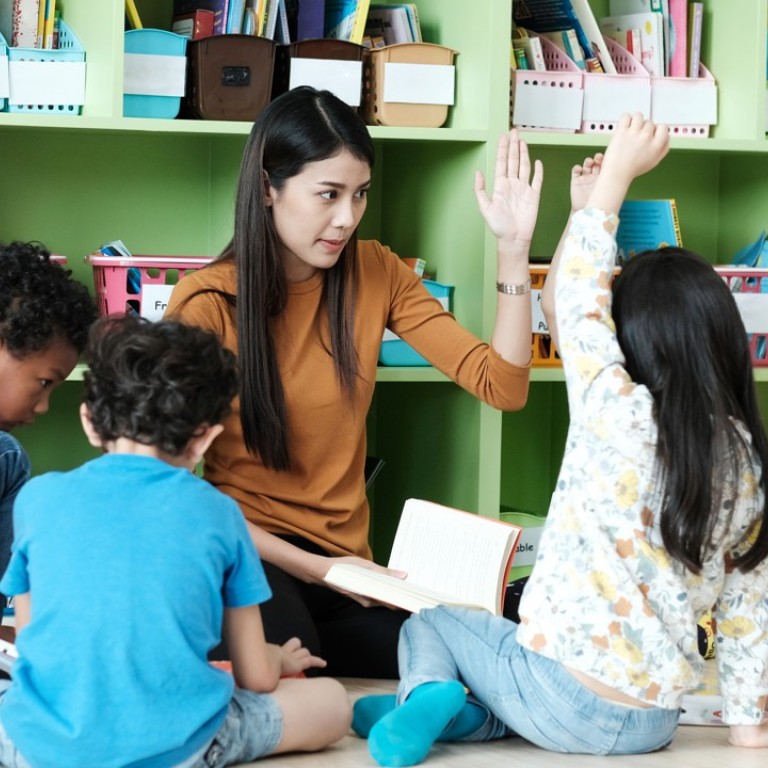
Private sector’s early childhood learning offers alternative to government-funded universities for early childhood learning
Graduates from the new programme at Yew Chung College of Early Childhood Education can attain qualifications in registered kindergarten teacher, childcare worker, special childcare worker and supervisor
Those interested in studying early childhood education can now choose alternative tertiary institutions to government-funded universities.
For example, Yew Chung College of Early Childhood Education (YCCECE) offers a four-year bachelor’s degree programme in early childhood education, after moving into its new campus in Aberdeen this year. It used to be known as Yew Chung Community College, and was opened 10 years ago to offer higher diploma and diploma programmes in the subject.
Graduates from the new programme will attain four early childhood education qualifications: registered kindergarten teacher, childcare worker, special childcare worker and supervisor. Those who have completed a higher diploma in early childhood education may also apply to study years 3 and 4 of the degree programme.
YCCECE president, Professor Shir-ming Shen, says the college is Hong Kong’s only tertiary institution focusing solely on early childhood education. It also benefits from being part of the ecosystem of Yew Chung Education Foundation, which has run bilingual international kindergartens for 85 years.
As a home-grown international education organisation, it also prides itself on having pioneered play-based early childhood education in Hong Kong, and boasts a long history of a bilingual curriculum that stresses the skills of reading, writing and speaking Mandarin as well as English.
Shen says these filter into the strengths of the programme, which offers a genuine English-speaking environment as it is the medium of instruction.
Teachers and scholars from the Yew Chung Education Foundation offer valuable insights into crafting a curriculum that trains students how to teach English and Chinese as foreign languages, as well as sharing information on the latest developments in education.
“Hong Kong has a unique situation where young children are expected to learn English and Chinese at a very young age,” says Shen. “More non-Chinese speaking families expect their children to learn Chinese, which can be challenging. This is why our course ensures teachers can teach Chinese as a foreign language.”
Degree programme students will need to complete 16 weeks of practicum and advanced practicum in both local and international kindergartens. They also have exclusive opportunities to apply for practicum in Yew Chung international kindergartens, thanks to the link with the foundation.
As well as an exchange programme and overseas trips to the UK, Australia, Singapore and South Korea, there will be visits to kindergartens the foundation runs in Hong Kong and across the border.
Students can state their preference when applying to the Yew Chung/Yew Wah Teachers of Tomorrow Scheme. They work full-time for a year as assistant teachers in Yew Chung or Yew Wah kindergartens in Hong Kong and the mainland and may be offered posts depending on performance and vacancies.
Graduates may also apply for teaching posts in international and local kindergartens, childcare centres, special schools and other settings.
More non-Chinese speaking families expect their children to learn Chinese, which can be challenging
For full-time students, school fees are HK$80,000 a year for the first two years, and HK$90,000 for years 3 and 4.
The foundation is offering eligible students some HK$7 million in scholarships, and an extra HK$1 million for non-Chinese speaking students.
Shen estimates that up to half of students receive some level of scholarship. The course
aims to take 30 to 40 students per cohort.
A shorter course is the four-month executive diploma in child psychology run by the Hong Kong Management Association and designed primarily for parents of younger children, teachers, social workers, and those working with young children.
Students meet once a week for a three-hour evening lesson. The course goes over what children should be learning at various stages, the construction of self-identity, and how school and parents can empower them to actualise themselves.
Lecturer John Chu says the course offers an insight into the urban myths in parenting and schooling, such as what defines a “good child” or a “good student”, or the use of punishment in shaping a child’s discipline.
“Most of our students are parents, while some are teachers. They all really put their heart and mind to studying the course,” says Chu.
“It is really heartening to see how much they care about their children.”
Tuition costs HK$9,900.
